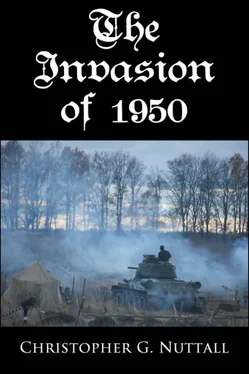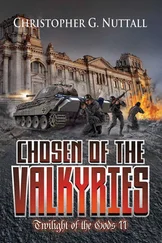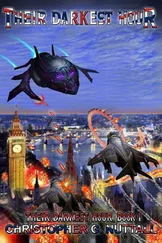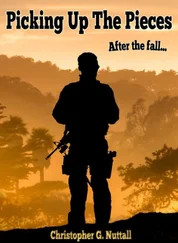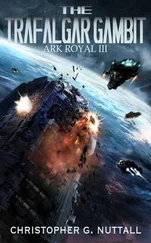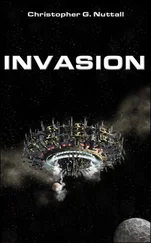He had only seen limited service during the war itself, but he’d seen the briefings and assimilated as much as his older fellows could teach him, particularly what had happened during the last air campaign against Britain. The Luftwaffe hadn’t been properly prepared for the war, with the result that they hadn’t been able to force the British to surrender. Richthofen — the unit had been named for the pilot from the Great War — had been training under the belief that they would go to war with Britain again, maybe against the Americans as well. The Americans were a huge question mark as far as the Reich was concerned. Although the official line was that Americans were a mongrel race of mixed blood, Schmidt didn’t have much time for the SS’s version of eugenics.
“The entire unit will be used in the assault, deploying a mass wave of the newer weapons,” Galland continued. Schmidt thought about some of the weapons that had been tested over the past two years and felt his teeth moving into a grimace; the British would never know what had hit them. “When the Fuhrer issues the order, the unit will go into lock-down and prepare for immediate launch; when the second order is issued, Richthofen will take off and proceed with the attack, regardless of what else happens. The wing will engage the British ships while the fighters keep the British fighters off their backs; once the bombs are launched, we will fall back and leave the British to clean up the mess.”
There were some chuckles from the pilots. The bombers — the crews of the Junkers Ju 290 jet bomber — looked relieved. They would know that while an old British fighter couldn’t touch them, one of the British jets would have no problems engaging them and bringing them down. Fighter escort always made the bomber crews happy. Very few of them had any faith in the weapons mounted on the bomber’s hull.
“We may have to launch a second strike once we have refuelled and rearmed the aircraft,” Galland said. The surviving aircraft, Schmidt reminded himself; Richthofen was going to get hurt badly in the strike. “It is hoped that we will have inflicted enough damage to ensure that we don’t have to return there, and in that case we will be assigned to supporting the assault against Britain itself, but we know better than to always hope for success.”
He paused. “We have a small team of agents near Scapa Flow itself,” he said. “The British Home Fleet currently consists of nine battleships, six carriers and forty smaller ships; the main targets are the battleships and the carriers. To add to our problems, there are actually three older carriers that date back to the last war as well as the three modern carriers; they have to be sunk as well. The British are currently going through an exercise of their own, so we will strike once they have returned to port and are digesting the results of their exercise and thinking about what it means for the future.”
Schmidt nodded again. Luftwaffe exercises tended to work out the same way; there would be a period of frenetic activity, then a second period of rest as exhausted crewmen staggered to their beds and sleep. Meanwhile, equally tired senior officers struggled to work out the lessons of the exercise and decide how to present them to their men. His pilots had as much training and exercises as anyone else in the Luftwaffe , but even they got tired after a few weeks of all-out effort. The old hands from the war swore blind that wartime was worse, but the younger pilots found it hard to grasp; they had never flown against a serious enemy that wanted to kill them.
“The British have three squadrons of Meteors and several other aircraft on the island itself and can probably request support from RAF bases in Scotland if they have to call for help,” Galland continued. “We will fly low towards the target, but we don’t expect actual surprise, so we will have to be prepared to sweep enemy fighters out of the sky. Accordingly, the first wave of fighters will be leading the way, followed by the bombers and the remaining fighters; the first wave will have to scatter the British and keep them scattered.”
Schmidt felt a flicker of pure excitement. His Messerschmitt Me 270 jet fighter was the hottest plane in the air, and he wanted to finally test himself against a real enemy. The British pilots were spoken of with respect by the older hands, unlike the Russians, who were regarded with scorn and hatred. The Russian pilots might have been brave men, but during the later years of the war, they had been more dangerous to their own men than to their Nazi opponents. Untrained, flying inferior aircraft, they had been flung into the fray… and butchered.
“I expect that each and every one of you will give his all to get Richthofen in perfect condition before the operation begins,” Galland concluded. “I have organised a massive series of training runs and operations, to be conducted by everything from smaller sections of Richthofen to mass exercises consisting of every aircraft in the force. This is going to put a strain on us, but I believe that we can handle it… and I will personally break anyone who slacks off, even slightly.”
His gaze passed around the room. Schmidt straightened up under his eyes. “We’re the best unit in the Luftwaffe and now it’s time to prove it,” Galland said. “Your training schedules will be posted on the main board; the first exercise will begin in one hour. Heil Hitler !”
“ Heil Hitler ,” the pilots echoed.
It was a dismissal. Schmidt stood up with the other senior officers and headed back to the workroom, intending to check the main board before too long. His unit was a fighter unit and he hoped — prayed — that they would have the point in the coming attack. They hadn’t really proven themselves, even though Richthofen had a long and distinguished history, and now was their chance. They would do or die.
* * *
Oberst Frank-Michael Baeck lifted an eyebrow as he saw an older man ahead of him, clearly heading towards the same office; the older man saw him at the same time and blinked at him. Baeck wasn’t fooled; he saw real intelligence and a certain wry sense of humour in the older man’s eyes, and wondered what he made of him. The older Germans certainly were keen on the army, but Baeck’s uniform was very rare; there were only a handful of amphibious units in the Wehrmacht .
“ Kapitän zur See Christian Wulff,” the older man introduced himself. His uniform was that of a Kriegsmarine reservist, rather than a serving officer; he looked as if he hadn’t worn the uniform for a long time. “You were called here along with me?”
Baeck nodded as they reached a door, tapped on it, and waited for the barked command. When it came, he opened the door and allowed Wulff to precede him, before following him into the room and straightening to attention as he recognised the man sitting on the other side of the desk. He was tall, almost unnaturally thin, with sharp penetrating eyes and a haze of brown hair on his head. Baeck would have come to attention for any senior officer, but he knew this one by reputation and meant the salute from the heart; Field Marshal Erwin Rommel himself.
“ Heil Hitler ,” he said, almost overcome with awe. His orders had said that he would meet a senior officer, but not Rommel himself. He would have sooner expected the Fuhrer than a man the lower ranks of the Wehrmacht idolised. “ Oberst Frank-Michael Baeck of the Hans Bader reporting as ordered, Herr Feldmarschall .”
Rommel nodded. “You have been selected for a dangerous mission,” he said, and ran through the background to Operation Sunset quickly. “Your unit… how is the training level at the moment?”
Читать дальше
